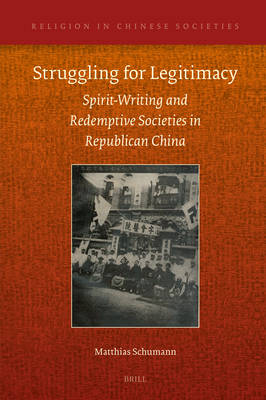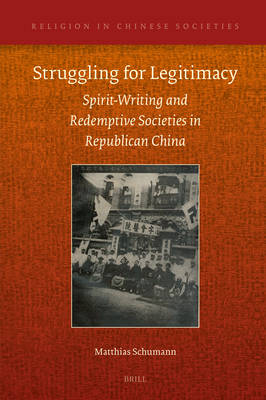
- Afhalen na 1 uur in een winkel met voorraad
- Gratis thuislevering in België vanaf € 30
- Ruim aanbod met 7 miljoen producten
- Afhalen na 1 uur in een winkel met voorraad
- Gratis thuislevering in België vanaf € 30
- Ruim aanbod met 7 miljoen producten
Zoeken
Struggling for Legitimacy
Spirit-Writing and Redemptive Societies in Republican China
Matthias Schumann
€ 248,95
+ 497 punten
Omschrijving
The Republican period was a time of radical change in which existing knowledge was questioned in light of newly introduced ideas. It seems puzzling that it was exactly during this period that the Chinese practice of spirit-writing, which had a history of more than a thousand years, experienced a boost in popularity. This book sets out to explain this puzzle. Focusing on the study of two newly founded redemptive societies, the Wushanshe and the Daoyuan, it shows how spirit-writing practitioners legitimized the practice by combining it with ideas and activities drawn from the fields of religion, Confucianism, and philanthropy. These legitimation strategies not only enabled spirit-writing practitioners to gain political acceptance, but also turned them into important actors in the social, cultural, and intellectual history of modern China.
Specificaties
Betrokkenen
- Auteur(s):
- Uitgeverij:
Inhoud
- Aantal bladzijden:
- 408
- Taal:
- Engels
- Reeks:
- Reeksnummer:
- nr. 20
Eigenschappen
- Productcode (EAN):
- 9789004727229
- Verschijningsdatum:
- 29/01/2026
- Uitvoering:
- Hardcover
- Formaat:
- Genaaid
- Afmetingen:
- 155 mm x 235 mm

Alleen bij Standaard Boekhandel
+ 497 punten op je klantenkaart van Standaard Boekhandel
Beoordelingen
We publiceren alleen reviews die voldoen aan de voorwaarden voor reviews. Bekijk onze voorwaarden voor reviews.








